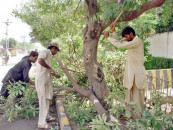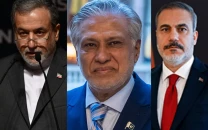‘Writers fought British colonialism with pen’
Literati provides guidance to people: education minister

In the Pakistan Movement, the pen was a major weapon which not only united people under the unfurled flag of an unborn nation but also fought back the colonisers.
This was suggested by the Federal Education Minister Shafqat Mahmood on Monday as he helped kick-off week-long Independence Day celebrations under the aegis of the Pakistan Academy of Letters (PAL).
PAL is a subdivision of the National Heritage and Culture Division, which also fall under Mahmood’s domain as the designated minister.
In his inaugural address, Mahmood said that writers of Pakistan always performed their duties with determination, boldness and courage and continued to provide mental and intellectual guidance to different sections of the society.
During the Pakistan Movement (Tehreek-e-Pakistan), Mahmood said that writers took full part along with the politicians to guide the people.
“In the newspapers and meetings of that time, writers fought with their pen for Tehreek-e-Pakistan against the British,” he said, adding that poets injected a new passion and encouragement to the nation through their poetry.
Literature, the federal minister said, is written all over the world with a purpose. Hence, the literature created by writers regarding the Pakistan Movement has significance, purpose and usefulness. The services of literature to the freedom struggle, he said, are unforgettable.
PAL Chairman Dr Yousuf Khushk said that literature is the only field in the world which transcends race, religion, creed and language while advocating for the freedom of thought and freedom of human beings.
Amid Covid-19, Pakistan's education crisis explained in 300 words
“Our writers have never succumbed to oppression,” he said.
Dr Khushk pointed to the roles of Sir Syed Ahmed Khan, Allama Iqbal Faiz Ahmed Faiz to Ahmed Faraz and Habib Jalib as the ‘long line of freedom fighters’ of whom we can be justifiably proud.
Prof Fateh Malik said that writers such as Allama Iqbal breathed a new life into the hearts of Muslims through their creations.
After the assassination of Liaquat Ali Khan, he lamented, Pakistan did not get any sincere leader and the spirit of Pakistan Movement weakened.
The nation was misled, he said, adding that Pakistan fell to the ideology of separate nationality. To put Pakistan back on the path of development, Prof Malik said the thinking of Quaid-e-Azam Mohammad Ali Jinnah and Iqbal must be adopted.
Pakistan’s education crisis: enrolled in schools, unable to learn
Writer and poet Kishwar Naheed said that women also worked hard in the freedom struggle, raising funds for the Muslim League.
Be it Tehreek-e-Pakistan, Tashkeel-e-Pakistan or Takmeel-e-Pakistan, people from all walks of life played their part in creating it. Noting the prevalence of progressive writers such as Saadat Hassan Manto at the time, today we are suffering from mental stagnation, she said.
Others who spoke in the ceremony included Ehsan Akbar, Jabbar Mirza, Aziz Sahir, Qazi Abid, Haroonur Rasheed Tabassum, Ziauddin Naeem, Ahmad Ataullah, Ali Manjhi, Rashid Hameed, Basira Umbereen and Hanif Khalil spoke on the occasion.
Published in The Express Tribune, August 11th, 2020.


















COMMENTS
Comments are moderated and generally will be posted if they are on-topic and not abusive.
For more information, please see our Comments FAQ